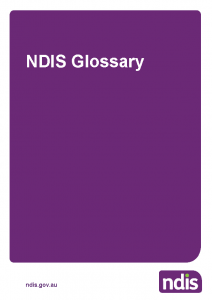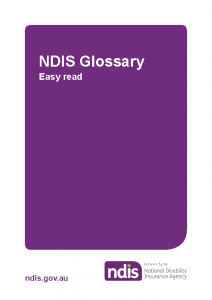Need help to manage your NDIS plan?
https://www.balancedaccount.com.au/contact/
NDIS terms & their meanings
The National Disability Insurance Scheme Act 2013 is the legislation which establishes the scheme and the National Disability Insurance Agency. The full act is available on the Federal Register of Legislation and can be viewed here
The NDIS rules are legislative instruments made under the NDIS Act and should be read in conjunction with the NDIS Act.
The Operational Guidelines are a set of guidelines and information held by the National Disability Insurance Agency to assist in its function of delivering the National Disability Insurance Scheme. The guidelines cover the following subject matter:
- Overview of the NDIS
- Access to the NDIS
- Planning
- Including specific types of supports in plans
- Specialist disability accommodation
- Child representatives
- Nominees
- Registered providers
- Compensation
- Information handling
All of the terms used throughout the NDIS legislation and rules are defined in the Act. Some common terms are listed here:
- carer - is an individual that provides personal care, support and assistance to another individual who needs it because they are a person with disability, and that care, support and assistance is not provided under a contract of service, as a volunteer or in the course of education or training
- child - is a person under 18 years of age
- choice and control - is the right of a participant to make their own decisions about how they would like to receive their supports and who from
- disability - is total or partial loss of a person's bodily or mental function. It describes a person's impairment of body or function, a limitation in activities or a restriction in participation when interacting with their environment
- formal supports - are supports that participants book and pay for
- goals - are things that a participant wishes to do or achieve in the future, with the help of the NDIS
- guardian - is a person in a formal caring role, acting for a person with disability. Parents are usually guardians
- informal supports - are the supports that participants get from people around them, like family, friends and neighbours
- local area coordinators (LAC) - are local organisations working with NDIA to help participants and their families access NDIS. They participants write and manage their plans, and also connect participants to mainstream services and community-based supports.
- mainstream services - are government services provided to the Australian public like health, mental health, education, justice, housing, child protection and employment services
- plan - means the participant's approved plan that is in effect under section 37
- plan manager - is a person or entity that is appointed by a participant to manage the funding in their plan
- planner - refers to local area coordinators that help participants describe their goals and write their plans
- plan nominee - is a person who is appointed under section 86 to act and make decisions for a participant who does not have a parent or guardian
- reasonable and necessary - means fair and something you must have. The NDIS funds reasonable and necessary supports relating to a person's disability - to help them live a normal life and achieve their goals.
- registered NDIS provider - is a support person or entity who is registered under section 73E. They have met the requirements for qualifications, approvals, experience, capacity and quality standards to provide a product or service.
- self management (funding) - is when participants receive and manage all or part of their NDIS funding and payment for supports themselves
- Supports - are things to help a person undertake activities of daily living and enable them to participate in the community and reach their goals



